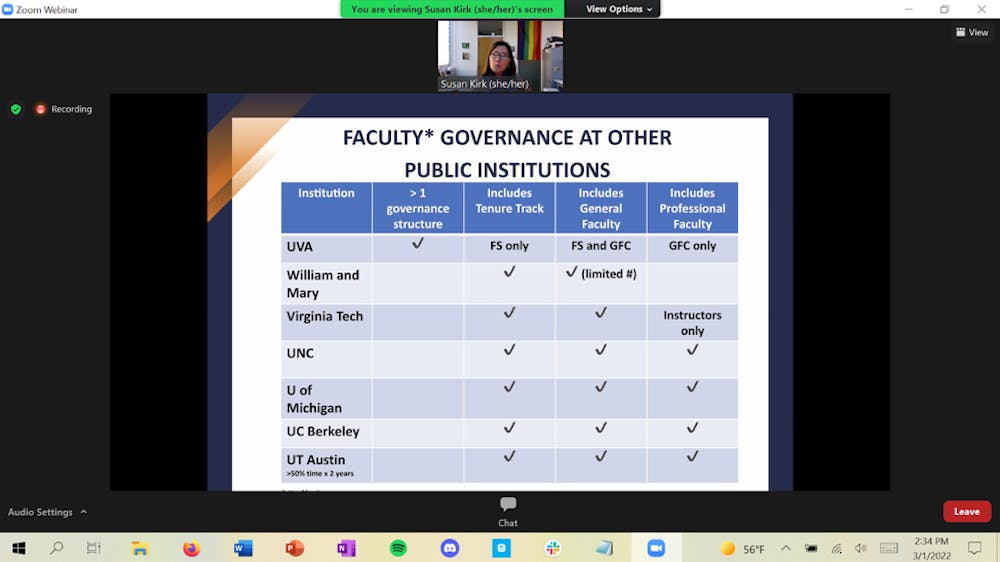The Faculty Senate gathered virtually Tuesday for its monthly meeting, during which members of the Senate reviewed candidates for its upcoming elections, heard statements from University President Jim Ryan and incoming Provost Ian Baucom and voted to draft a public statement reaffirming the University’s practice of full academic freedom in regards to recent debates over critical race theory.
The Faculty Senate is an elected body of 80 professors drawn proportionally from all schools. The group meets regularly to advise the president on curriculum, faculty perspectives and other University affairs.
The Faculty Senate began the meeting by hearing candidates for its upcoming internal elections for chair-elect and executive council positions. Assoc. Education Prof. Michael Kennedy is running unopposed for chair-elect. School of Medicine Prof. Jay Fox, Commerce Prof. Jeri Seidman, Commerce Prof. Rob Patterson, Data Science Prof. Brian Wright and Law Prof. Sarah Ware gave statements about their platforms for two open seats on the Executive Council. The Faculty Senate will vote and results of this election will be announced no later than March 15.
Citing concerns about the University’s shared-governance system and the way it splits faculty into two separate governing bodies, Chair and Medicine Prof. Susan Kirk gave a presentation on the history of the Faculty Senate. The shared-governance model places governing authority in the Board of Visitors, while the Faculty Senate assists the Board by providing advice on academic matters. Similar to student bodies at the University, faculty have a long history of involvement in administrative decisions, starting with the Senate’s formation in 1926. For example, faculty members serve as non-voting consultants on Board of Visitors committees.
Baucom’s recent appointment without Senate consideration was opposed by some faculty. Typically, the University’s Human Resources department makes a public posting about a job opening for a high-level administrator, and the president then appoints a search committee to identify candidates. In Baucom’s selection process, Ryan did not conduct a formal search, leaving many faculty and staff members with the impression that their input was excluded.
Among newer concerns, Kirk also discussed the long-standing divisions between the Faculty Senate and the General Faculty Council, which represents all non-tenure track professors. She said she found that the University is the only among several of its peers to have separate governing bodies for tenure-track and general faculty.
Although the Faculty Senate is more inclusive now that it has been in the past, Kirk said there are still certain divisions to be bridged.
“We’re a long, long way from the 1970s and 1980s, where neither general faculty nor women were welcome in the Faculty Senate,” Kirk said. “But it would be important to show that we’re united.”
The Faculty Senate did not consider any official resolutions on the issue, but a working group has been formed to gather information on the distribution of non-tenure track faculty across the various schools.
The Senate then heard from Baucom, who officially began his new position Tuesday. Baucom succeeds Provost Liz Magill, who will leave the University July 1 to serve as President of the University of Pennsylvania. He expressed appreciation for the University’s unique system of governance and remained open to learning more about his role in it.
“I want to serve you,” Baucom said. “I want to understand how I can help you.”
Baucom also stressed the importance of academic freedom at the University, a topic made relevant by recent measures from Governor Glenn Youngkin. Part of Youngkin’s platform focuses on the elimination of “divisive concepts” — such as critical race theory — from schools. Consequently, University professors have faced new Freedom of Information Act requests regarding their syllabi amidst state-level investigations into potentially controversial curricula.
Attorney General Mark Miyares began his term in a similarly controversial fashion by firing University counsel Tim Heaphy and issuing new legal opinions that directly opposed the University’s mask mandate.
“Your academic freedom … is the defining heart of the University,” Baucom said. “Universities live only to the extent that faculty can teach and research and study whatever they wish.”
Education Prof. Patricia Jennings raised special concerns about critical race theory, an academic study of the role of race in policy issues, which is taught in some curriculums and researched at the University. Youngkin has specifically targeted critical race theory in both early and higher education by establishing a tip line to report teachers and professors for divisive curricula. Other professors also raised concerns about academic freedom, citing a lack of employment commitment for non-tenured professors.
“We teach critical race theory at this University,” Baucom said. “It’s a fact. And I will support our faculty.”
After some discussion, the Senate voted to draft a statement in favor of academic freedom across all American universities, prompted by a similar statement from faculty at the University of Texas. Ryan and Baucom said that they were unsure whether they would endorse the Faculty Senate statement or make a separate one but regardless of his endorsement, Ryan said the Faculty Senate should make a statement based on its own opinion.
The next Faculty Senate meeting will be held in early April. The Senate is expected to swear in new executives, vote on a drafted statement and take new business.







